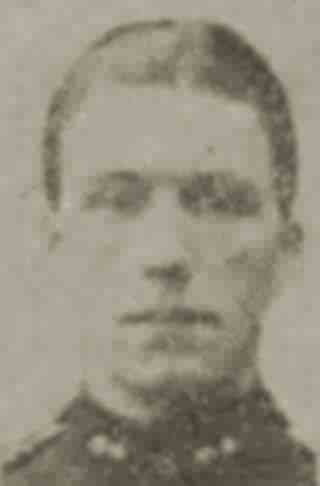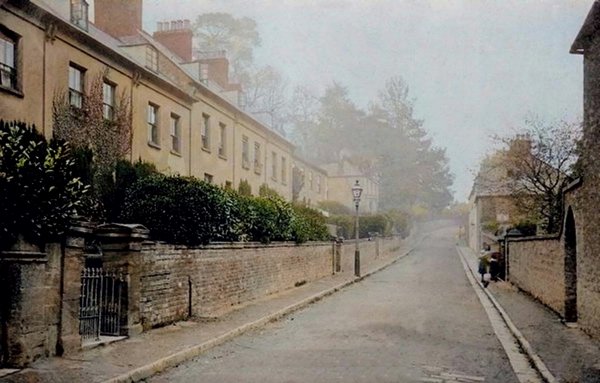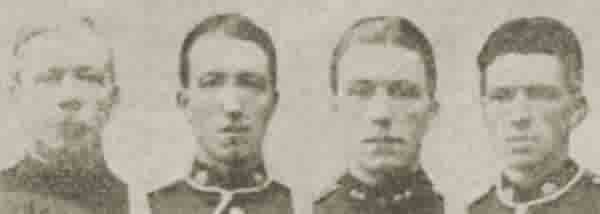yeovil at War
Arthur Douglas Kemp Jones
Blinded while on active service, died in Yeovil
Arthur Douglas Kemp Jones was born in 1893 Merthyr Tydfil, South Wales, the third son of Professor of Music and Bandmaster of the West Somerset Imperial Yeomanry, Frederick David Jones (b1861) and Bessie née Wilson (b1861). All nine of Frederick and Bessie's children were born in Merthyr Tydfil but between 1902 and 1911 the family moved to Yeovil. In the 1911 census they were listed living at 18 Brunswick Street and 18-year old Arthur was an apprentice in the printing works of the Western Gazette and spent over four years in the reading room.
Arthur served with 'D' Company (Yeovil), West Somerset Yeomanry like his father and two brothers, and enlisted at Southampton on 22 August 1912, joining 59th Field Company, Royal Engineers. His Service Number was 23205.
Arthur was sent to France on 18 August 1914. It is known that Arthur spent 2 years 3 months on active service with the Field Force - but where he served is unknown other than he served on the Western Front as part of 5th Division.
|
A
letter
published
in the
Western
Gazette,
30
October
1914
A
letter
published
in the
Western
Gazette,
27
November
1914 In a letter to his sister he says: "There has been a terrific battle around here these last two or three days, especially the artillery shells diving and bursting all around. There are any amount of German prisoners being brought back and one of them had the 'neck' to be dressed up in one of our uniforms with the exception of the hat which was a Frenchman's. They seem to be all ages, some very old and some very young. The weather is cold and damp at present, quite a change from what we have been having." Sapper Jones also sends a letter to his mother dated Nov. 15th in which he says: "We have shifted a good many miles since my last letter. The weather is somewhat awful, raining cats and dogs day and night. I can tell you it is rather uncomfortable for the troops, but they are simply splendid. We had rather a warm time in one billet. One big shell dropped 20 yards from the house and the hole it made was big enough to bury a dozen horses in it. One poor fellow I knew happened to get hit by a common shell and was wounded in three places and I'm sorry to say he died in a few minutes afterwards. He was buried just in front of the house and a little wooden cross made by one of our sappers was put in the heart of the grave. The other night the Germans got a chateau for a night's rest, but I'm sorry to say they got disturbed. The artillery were given the tip off and they rushed a gun up to within 400 yards and opened fire on the house which was absolutely blown to bits. We are gathering plenty of prisoners. Everybody is doing it but at the same time I shan't be sorry when it is all over."
A
letter
published
in the
Western
Gazette,
27
November
1914
from
"Letters
home to
Yeovil
in the
Great
War,
1914 –
1919"
by Jack
Sweet |
 He was seriously
wounded during
his service and
on 19 October
1916, while
chopping wood, an
accidental
puncture wound left him blind
in his right
eye. He was
hospitalised and
faced several
operations
without success. This
eventually led
to his honorable
discharge from
the army on 20
June 1917 and
his death at his
home at 18
Brunswick Street
on 23 August
1917. He was
aged 24 and was
interred in
Yeovil Cemetery.
He was seriously
wounded during
his service and
on 19 October
1916, while
chopping wood, an
accidental
puncture wound left him blind
in his right
eye. He was
hospitalised and
faced several
operations
without success. This
eventually led
to his honorable
discharge from
the army on 20
June 1917 and
his death at his
home at 18
Brunswick Street
on 23 August
1917. He was
aged 24 and was
interred in
Yeovil Cemetery.
In its edition of 24 August 1917 the Western Gazette reported "The death occurred at his home in Brunswick Terrace, early yesterday morning, of Douglas Arthur, third son of Bandmaster Jones, of the W.S.I.Y., and of Mrs Jones. Deceased who was 24 years of age, had experienced two years and two month’s active service in France with the Royal Engineers, being discharged on June 20th, having completely lost the sight of his right eye, and otherwise seriously injured. He was formerly employed for about four and a half years in the reading room at the “Western Gazette” and joined the Regular Forces sometime before the outbreak of war, having previously served with the W.S.I.Y. (West Somerset Imperial Yeomanry). Deceased was also a chorister of the Holy Trinity Church and a prominent member of the Church Lads’ Brigade. He was very popular and highly respected in the town, and sincere sympathy is felt with his bereaved family. It is only about a year ago that Mr and Mrs Jones lost another son."
In its edition of 31 August 1917 the Western Gazette reported "The funeral took place on Monday afternoon at the Cemetery of Mr Douglas Jones, whose death at his home at Brunswick Street, at the age of 24 years, was reported in last week’s issue. The late Mr Jones, who was formerly employed on the staff of the “Western Gazette,” joined the Army shortly before the outbreak of war, and served over two years active service in France, and had seen some severe fighting. He was discharged on June 20th, as the result of injuries. For the funeral the Yeovil Company of the 3rd Battalion, Somerset Volunteer Regiment furnished firing and bearer parties, the former according the usual honours to the remains of the deceased as they were brought from his home in Brunswick Street and placed in the hearse by the bearer party. Then the procession left for the cemetery in the following order:- At the head with arms reversed, the firing party, in charge of Company Sergeant Major Allbutt; the hearse and mourning coach containing Mr Trevor Jones, late W.S.Y., Lance Corporal Gilbert Jones, W.S.Y., Misses Amy, Flossie and Dilys Jones – brothers and sisters of the deceased; a large party of Volunteers; wounded soldiers from the Red Cross Hospital; the Men’s Voluntary Aid Detachment, under Section Leader J Goodchild; Quartermaster H Mott, V.A.D.; and Captain and Adjutant Bell of the Volunteers, who was in command of the parade. The service was conducted by the Rev. GC Seymour, curate of the Parish Church. After a portion of the service had been said in the chapel, the Union Jack covered coffin was borne along paths lined by the troops to the grave, and after that they formed up near the grave, and in the presence of a large and sympathetic gathering, the committal prayers were said. At the close, the firing party fired the customary three volleys, and the “Last Post” was sounded by Private E Rattle of the Royal Berks, an old school chum of the deceased soldier. Bandmaster FD Jones, the bereaved father, was unable to be present owing to having been recalled from his leave before the funeral. There were several handsome floral tributes."
The Western Gazette further reported, on 17 October 1919 "Mrs Jones of 18 Brunswick Street, has received from the Record Office, Chatham, the 1914 Star which would have been conferred upon Sapper DA Jones, R.E., had he lived. The Star was sent in memory of his services with the British Expeditionary Forces in France and Belgium between the outbreak of war and midnight on 22/23rd November 1914. In forwarding the decoration, the officer was commanded by the King to assure the recipient of His Majesty’s high appreciation of the services rendered. - The late Sapper Jones, who was formerly employed in the Reading Department of the Western Gazette was in the Royal Engineers when war broke out and went to France with his unit. He was ultimately invalided out of the service as a result of wounds and sickness, and died, much to the regret of his many friends, sometime afterwards. Mrs Jones has also received a Scroll of Honour inscribed as follows “No 23205 Sapper DA Jones, Royal Engineers. Served with honour and was disabled in the Great War. Honourably discharged on 30th June 1917:- George R.”
Arthur Jones was interred in Yeovil Cemetery and his name is inscribed on the Yeovil War Memorial in the Borough.
gallery

Arthur Douglas
Kemp Jones
1893-1917

This
colourised photograph
features in my
book "Lost Yeovil"
A postcard dated 1906 looking along Brunswick Street with Brunswick Place and Brunswick Terrace at left. The Jones family lived in one of the houses at left.

Bandmaster Frederick Jones, West Somerset Yeomanry, of Brunswick Street, at left with his three serving sons; left to right Trooper Trevor Jones, West Somerset Yeomanry, Sapper Douglas Jones, Royal Engineers and Trooper Gilbert Jones, West Somerset Yeomanry.